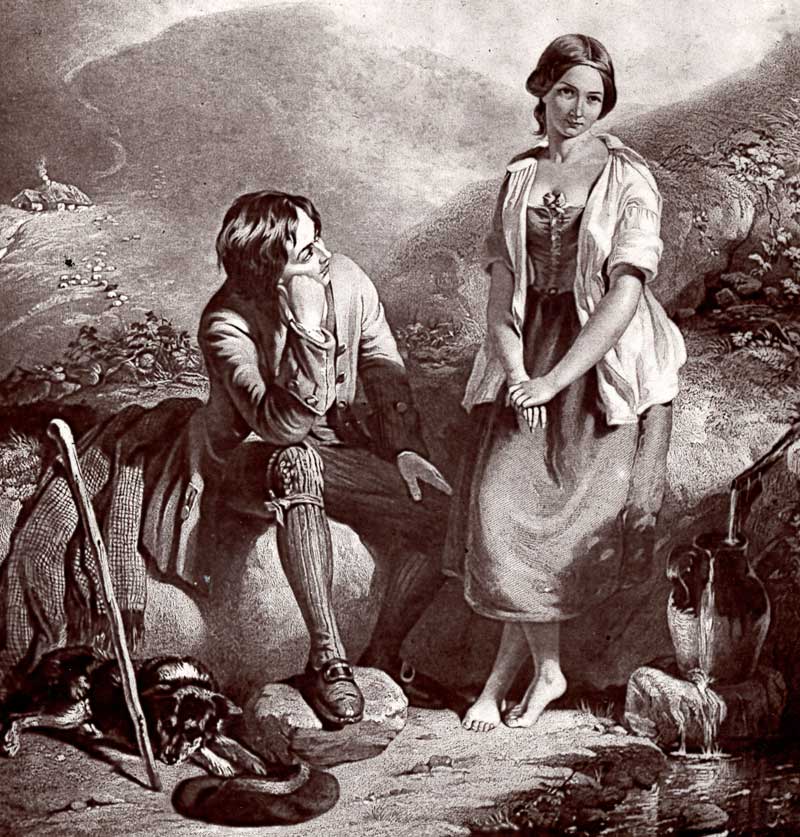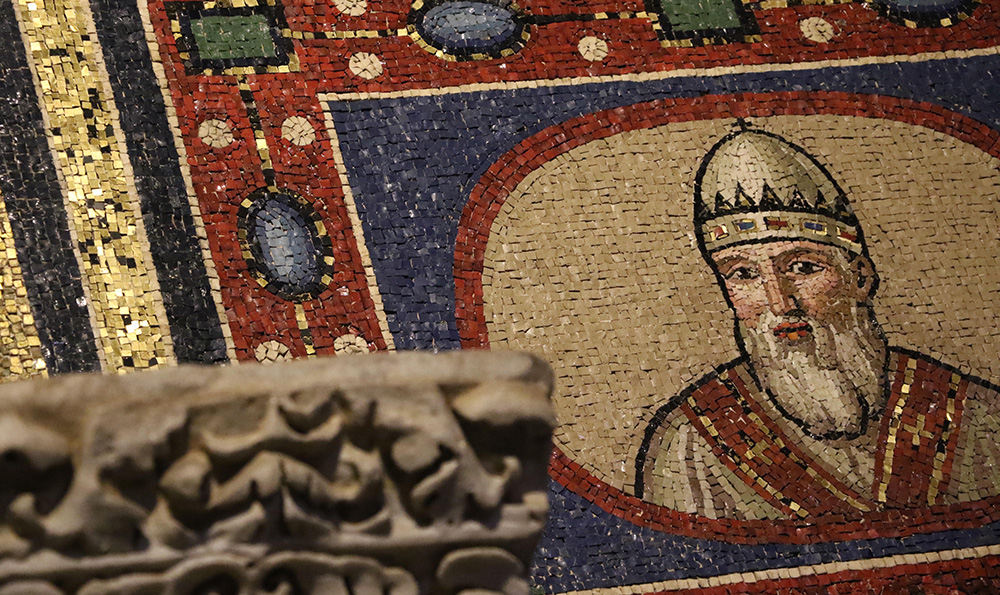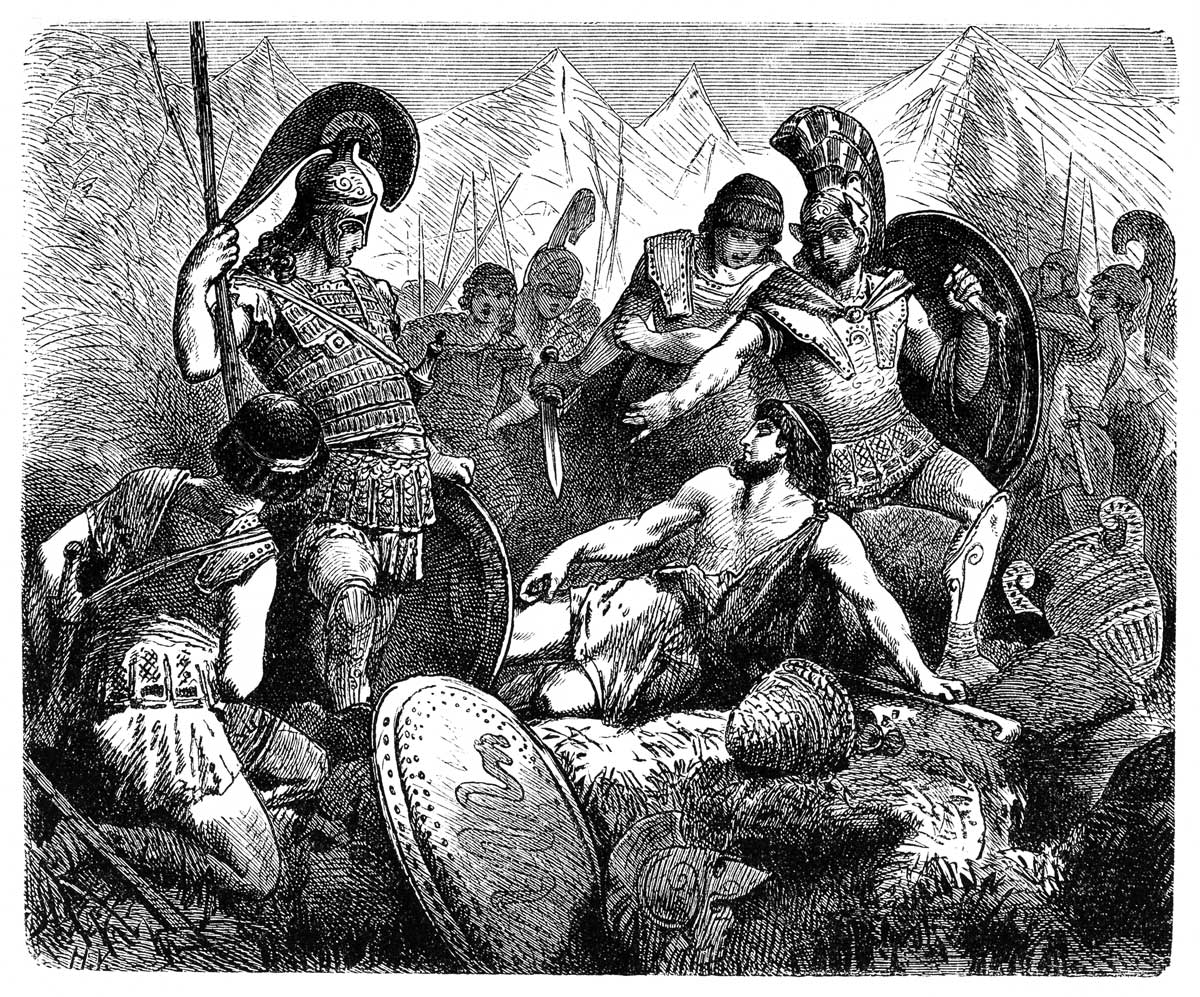Sexual Being
The Love of Purity Opens Our Minds to a Radiant Mystery
by Anthony Esolen
Several years ago I wrote a book, Ten Ways to Destroy the Imagination of Your Child, as a polemic against all the foolish and fundamentally cruel things we do to our children, to cramp them, to ready them, at best, for the hamster-treadmill of contemporary life, which energetic and restless device often goes by the name of "career." I like the old meaning of "career," which suggested undirected racing, or careening from one wall to another. In that book, under an ironically diabolical voice, I urged parents to take their children off the treadmill, so that they could once again do the human things—like lie on their backs on the grass to look up at the sky.
There is a whole glorious world out there for children to wonder at and in; it used to be called "outside." And then, too, there is an even more glorious world for children to encounter, an "inside," if you will, to be found in those strange creatures called "other people," and especially in the strangest creatures of all, those that are like me and not at all like me, those with the smooth chins and the gentle voices, or the broad shoulders and the far-seeing eyes—those creatures of the other sex. "Except you become as little children," says the Lord, "you shall not enter the kingdom of heaven." That is not a stipulation. It is simply the way things are. There is no other heaven, and there can be no other heaven, than that which we receive as children receive a gift.
So then, how do we encounter that vast world beside us? How do we encounter the world of persons, male and female?
How Not to Know a Thing
Not as objects to reduce and manipulate. Here I will take a cue from Hans Urs von Balthasar, and his brilliant philosophical work, Theo-Logic: Truth of the World. In this work, Balthasar leads the reader through an intricate analysis of what it means to be a knowing subject and an object of knowledge. It is a fascinating demolition of the project that has held modern man bound—in a kind of hypnotic daze—since Descartes and Bacon. For them, knowledge is power, and power is domination; it is the extraction from the object of those measurable features that we can put to our use.
The project is confessedly reductive. The lump of coal I hold in my hand is not a thing of mysterious beauty, its glossy black surface having been pressed into smoothness by the slow work of centuries. No, it is only a coagulation of carbon, which, if burned in a certain fashion, will yield up a certain number of calories. The bird I see pecking at seeds in the yard is not a hen, but a protein machine, to be trammeled up in a cage and stuffed with chemicals so as to produce meat at a certain rate per dollar of feed and with a certain content of fat.
I hope these examples suffice to suggest that, if knowledge is reduced to that which gives me dominion over a thing for its profitable use, the defect is not in the thing so used but in the user; it is not the chicken that is blind, but the chicken manufacturer. If we are really to know a thing, says Balthasar, we must open ourselves up to the mystery of its being. We surrender ourselves to it in humility. Its own disclosure of itself, and our receptive listening to it, he says, "are but two forms of a single self-gift." Thus, love is essential to the act of knowing, for "knowledge can be explained only by and for love."
Where, in our various schools of misery, do we learn that to know something truly we must open ourselves to it in love? Are not young people rather taught to pretend to know by defying and despising? But consider how profound the resulting ignorance must be, especially if we are talking about things human. Or something worse than ignorance. "We murder to dissect," says the poet Wordsworth; that is, in order to dissect something, we have to treat it as a dead thing.
Revelation in Love
But a human being is not only alive. He is himself a subject, a free being who can choose to reveal himself to us, and upon whose self-revelation we depend, if we are to attain any deep knowledge of him at all. It is just then that we see a reversal in the relationship of the subject and the object. The knowing subject, far from being an anatomist slicing open a corpse to disentangle its veins and arteries, is himself more clearly the patient here, the one who must wait upon the initiative of the object, waiting in love for the revelation that is born of love.
And there is more. The object of our love is not the only person we come to know, and not the only beneficiary of our knowledge. We can know ourselves truly only when we communicate ourselves in love, but the act of communication depends upon the reverence of someone else, who rejoices in the mystery of our being. So true is this, that the lover may come to know us better than we know ourselves, and, says Balthasar, "many wait only for someone to love them in order to become who they always could have been from the beginning."
"It is not good for the man to be alone," says God in Genesis, and it is the first time in Scripture that God, who has been creating the whole universe, has declared that something is not good. If the man is alone, he is not yet wholly a man; he needs another like himself. And that is when God creates woman, and presents her to Adam, who cries out, "This at last is bone of my bone and flesh of my flesh!" Yet Eve is not simply a different person from Adam. In the very separation of the sexes, one from the other, alike and unlike, we find as it were the heart of what it means to know and to be known, to love and to be loved.
Reduced to Facticity
It may be an abstruse opening to my essay here, but I beg your patience. Consider again the attitude of one who has reduced knowledge to facticity that can be put to use: to know a thing, for such a person, is to have analyzed a thing's measurable features so as to make use of them for profit or pleasure. Beauty is defined as what happens to please the beholder for his own purposes, and not as the resplendent glory of the object's inner nature.
What will such a person think of the sexes? Imagine the debased Baconian writing a sex education manual. We will find all the tabs and slots duly labeled, their physical functions described with a clinical detachment that is the cover for a deep prurience—literally, an itch, an itch to splay a thing out in naked facticity, so that all sense of mystery will be destroyed. Persons are not addressed, but are appetites, and the parts of a machine, one's own machine or somebody else's, to employ in the satisfaction of those appetites. Even a stomach or an intestine would be more lovely than that, and not rightly to be described in mechanical terms; but here we are talking about the sexes, oriented in their physical and psychical natures the one to the other, for the act that binds them to one another in that one-flesh union that bridges the time past and the time to come.
It is, I suppose, of some consolation that, like moss growing in the cracks of ugly concrete, there is still some shallow-rooted attraction of one sex for the other. Boys still like girls, and girls still like boys. At least I hope so. But I doubt that they enjoy the full glory of that attraction, that they delight in the mystery of the other sex.
Never have popular magazines—I am thinking of the ghastly things whose covers strike my eye when I am at the drug store picking up a prescription—had more to say about the mechanics and the superficies of the sexes, and less of any genuine sense of what a boy, or a girl, or a man, or a woman, really is. It is as if we believed we could come to know what a hen is from studying x-rays of the poor bird fattened in a feeding cage, and not that awkward and comical and, yes, mysterious creature perching upon the coop and ruffling its feathers to the air.
Rosalind & Orlando
What effect this flattening has upon our capacity to learn anything at all, I will discuss shortly. First, a couple of examples of a true receptivity to the mysterious sex—namely, the other sex. Behold two scenes from the plays of Shakespeare. The first is from the comedy As You Like It. We are at the court of a wicked duke, who has usurped the throne from his brother and sent him into exile in the forests. His daughter and his niece Rosalind, however, are bosom friends, and they suffer together the evil he has done, bearing it with a fine blend of youthful sprightliness and sadness.
Well then, this duke is attempting to ease the tensions of his court with some entertainment, a series of wrestling matches. His champion has already thrown all the challengers, breaking the neck of one young man so that he must be carried away in danger of his life. To this arena then the two young ladies come, and they meet there a handsome young man, Orlando, the final challenger. He does not seem a match for the champion. The girls approach him, to try to plead with him, so that he will give up the challenge and preserve his life.
In reply, the young man reveals something of himself. He, too, like the niece, is lonely. He, too, has suffered. He does not wish to deny the fair ladies any request, he says, but rather he pleads for their good wishes to go with him. It hardly matters otherwise if he loses: "I shall do my friends no wrong, for I have none to lament me; the world no injury, for in it I have nothing. Only in the world I fill up a place, which may be better supplied when I have made it empty." At this moment, Rosalind is smitten. Orlando is brave, manly, eloquent—a profound mystery. "The little strength I have," says she, "I would it were with you."
Let us pause here to consider what Rosalind says. There is no silly pretense that Rosalind could throw a right cross and send the champion sprawling. We have no computer-generated choreography. Rosalind confesses that she has "little strength." Yet how often does the slenderness of a woman's arm belie the mighty pulses of her heart? We will witness throughout the play the strength of Rosalind's purpose, her solid good sense, her resolute love. What strength she has, she does not hoard up for herself, but offers it as a gift. Indeed, moved by the compassion of the young women—a compassion he has hardly ever experienced—Orlando embarks upon the perilous fight, throwing his opponent. "O excellent young man!" cries Rosalind. He is victorious; indeed it is the champion who must be carried off, unable to speak.
Still, all is not well. For when Orlando reveals his name to the duke, telling him that he is "the youngest son of Sir Rowland de Boys," the duke, constrained by his own guilty conscience, dismisses him curtly:
I would thou hadst been son to some man else.
The world esteemed thy father honorable,
But I did find him still mine enemy.
So the duke exits, incapable of love, and resisting the truth. But Rosalind now has yet another reason to hold Orlando in high esteem. Says she: "My father loved Sir Rowland as his soul, / And all the world was of my father's mind." Thus, the beauty of a friendship we hear of but do not see, since Sir Rowland has passed away, persists into the next generation, and helps to beget a new love.
Rosalind approaches Orlando. She gives him a keepsake. He is speechless. He considers himself but a rude farmer boy by comparison with the beautiful girl of the court. All arms and legs he is, all wrist-bone and cowlick. In his very strength he stands as if exposed to the world, his muscular courage concealing the shyness of a boy. But the girl approaches him, she with her gentle voice and her tender limbs, and says, boldly confessing her own weakness: "Sir, you have wrestled well, and overthrown / More than your enemies."
Florizel & Perdita
Another scene, this one from the great romance of resurrection, The Winter's Tale. We are at a sheep-shearing party. A country lass is the center of attention. She is dressed as mistress of the feast, but her natural shyness makes her abashed to be so. But that makes her appear all the lovelier in the eyes of those who look upon her, especially the young man who has pledged his love. He is the prince of the kingdom, Florizel, though he has not yet revealed that fact to the old shepherd who is, as everyone believes, the girl's father.
She, Perdita, is the lost daughter of a king, though neither she nor anyone present at the feast knows it. She decks her guests with flowers, and, in a flight of girlish desire, wishes to see Florizel strewn with blossoms "like a bank for Love to lie and play on." At that, she blushes and says that it must be the robe she is wearing that has changed her disposition. But Florizel says that she never says or does anything out of turn:
What you do
Still betters what is done. When you speak, sweet,
I'd have you do it ever; when you sing,
I'd have you buy and sell so; so give alms,
Pay so; and for the ordering your affairs,
To sing them too. When you do dance, I wish you
A wave o' th' sea, that you might ever do
Nothing but that—move still, still so,
And own no other function. Each your doings,
So singular in each particular,
Crowns what you are doing in the present deeds,
That all your acts are queens.
It is, I believe, one of the profoundest expressions of love in all of literature, and not because it focuses upon the feelings of the lover, or upon the stripped body of the beloved. As mysterious as a wave of the sea, so mysterious and lovely are the movements of Perdita when she dances. Florizel whimsically imagines Perdita singing as she does the most mundane things, because when she sings, that is all he ever wants her to do. But his words cause us to see and hear Perdita doing just that, as if, when she buys and sells, when she gives alms to a beggar, or orders some groceries, she does sing, though only the lover can hear the melody.
One cannot generalize from Perdita. There are no abstract laws that will account for her actions and dispel the mystery. In this regard she is like all human beings, except that her extraordinary goodness and innocence throw that mystery into high relief. What she does is "singular in each particular," and it is that never-to-be-replicated singularity, the beauty of the existence of this particular woman, that reveals her to the eyes of her lover, and causes him to exclaim that all her acts are queens.
He knows Perdita, and he cannot ever come to an end of knowing her. He does not know that she is a princess, but he does indeed know it, though that is not something that can be known in the sense of a fact that is logged and dispensed with. Even a sunset or a tree, as Balthasar says, is always more than itself, not less; so much the more, then, the beauty of a virtuous woman, beheld by a virtuous
man.
Always More
Now I hope it will cause no controversy to note that in both these scenes the sexes are not interchangeable. For what is interchangeable is of no importance. I can interchange one battery in a robot for another, precisely because the particular battery does not matter. There is also no sense of beauty attached to what may be replaced without harm. We do not say, of an air by Mozart, that the beauty of a particular run of notes depends upon their being replaceable with any old run. We say instead that the art is so well crafted, we cannot imagine it otherwise. We do not wish it otherwise. We are overcome with astonishment and gratitude that it is what it is, nor can we come to an end of fathoming its beauty, its very being.
So, too, with Rosalind and Orlando, with Perdita and Florizel. It is not simply that we can't reverse the sexes in these scenes without lapsing into raucous absurdity—Orlando falling in love with a lady wrestler and giving her a necklace to wear in his honor. It is rather that these characters, in the depths of their sexual being, cannot cease to fascinate us, if our hearts are open to the truth. Each is in one sense unveiled to us: Perdita is the essential young woman, gracious to everyone, yet passionately in love with a fine young man. But in that unveiling there is revealed to us the existence of ever more profound mystery. There is always more and more to know, more that yet dwells behind the veil. Says the shepherd father about Perdita and Florizel:
If [he]
Do light upon her, she shall bring him that
Which he not dreams of.
The pronoun "that," in its very indefiniteness, is the closest the old man can come to the inexhaustible goodness of a woman as pure as Perdita. What is "that / which he not dreams of"? If heaven is, as Dante puts it, "to live in loving, necessarily," then heaven is both the answer to our dreams and that which we cannot dream of. Jesus says to us, "Seek, and ye shall find," but the converse is also true, that they who find the truth shall seek all the more, in that reveling in the depths of love that unites knowledge with the joy of a small child dipping his toes into the vast ocean
beyond.
For the lover, for the soul that has found the truth and fallen in love with it, there is never an "only" in his thought, but always still more, and more. Perhaps this is the meaning of that mysterious saying of Jesus, that to them who have, more will be given, but from them who have not—I will say, from the programmatic reducers and deniers of this world, for whom "only" is almost the only word in the lexicon, those who say that a man or a woman is "only" a creature with certain insignificant organs, or "only" a set of culturally induced prejudices—from them who have not, and who do not wish to have, who find nothing and seek nothing, even that little they have will be taken away.
To Open Our Minds
I hope you will see, then, the connection I wish to draw, between a healthy imagination and the readiness to delight in the goodness of each sex, rather than to scorn it, to ignore it, to pervert it, or to pretend that it does not exist. For God has given men to women and women to men not only to prolong the species, but to open our minds. So then, keeping in mind the mystery that each sex presents to the other, the mystery of maleness and femaleness that runs, as Balthasar says, like a fissure through the whole animal world, and that presents to us in a most potent way the fact that genuine knowledge must spring from love as fruit springs from the flower, what will be the virtue that honors that mystery? What will that virtue have to do with both the growing awareness of man and woman for one another, and with the development of their minds and souls more generally? What is the role of a teacher, or a school, in the encouragement of that virtue?
The virtue is not abstinence, or even temperance. I might abstain from eating rich food because I am training for the arena. I might abstain from sexual intercourse because I do not wish to be saddled with a debilitating disease. If we learned that Orlando had been preparing for the wrestling match by a dietary regimen, that would add nothing to our esteem for his youth and manhood. If anything, it would steal from the power of the match, which is a public revelation not of the strength of his body so much as the honor of his being: he is, as he says, the youngest son of Sir Rowland de Boys.
Florizel assures Perdita that she has nothing to fear from the merry sheep-shearing, nor need she be embarrassed by their costumes, since even the gods took on various shapes for love, though their loves were not as chaste as his,
since my desires
Run not before mine honor, nor my lusts
Burn hotter than my faith.
Suppose he had said to Perdita, "You need not worry about me, since I have kept myself clean of syphilis." What would that make him in our minds, if not a petty calculator of advantages to himself, a man unworthy of Perdita's surpassing beauty?
No, when we possess something holy, it is not enough to say that we do not hire it out for use. It is what we do with it, and not what we decline to do with it, that defines the proper virtue. We cherish it. We give it due reverence. We keep it veiled in our hearts, not because we are afraid of it, or ignorant of it, but because we know that no bald public presentation of it can do it justice. We ourselves cannot fathom its profundity.
The virtue that honors what is holy, especially as it is veiled and made manifest in the bodies and the hearts and the minds of man as man and woman as woman, is purity. Abstinence is defined by absence and refraining, but purity is rather an essential light radiating from the core of the holy. If we owned a masterpiece by Caravaggio—let us say The Conversion of Saint Paul—we would not say, "We must exercise abstinence with regard to this painting, and refrain from spitting on it." We should be ashamed to dishonor it so. We would wish to keep the work in its special place, in a certain sense hidden from the common vulgarities of the day, precisely to guard it, to honor it, to veil it, and to reveal it in its own special light.
A Mystery to Be Guarded
Purity does not deny the power of sex. Rather, it rejoices in that power. It is impurity that degrades, denies, and despises. Consider again the scene between Orlando and Rosalind. Suppose a modern actress were to game the scene by writhing with physical desire—laying herself in a sense naked to the audience but extinguishing the radiance of her sex by the smoke of lust. She would put us in the position of jaded sophisticates, who "know" everything there is to know about the attraction of these two young people, which is to say, not much at all.
Or consider the scene between Florizel and Perdita. Suppose a modern actor, while saying, "Nor my lusts / Burn hotter than my faith," were to slip his hand underneath Perdita's gown, while she gave a little appreciative squeal and pushed his hand away. Oh, the audience would laugh, the knowing laugh of the ignorant, the cynical laugh of those swaddled up in their savoir-faire. The critics would praise the direction as "edgy," another word for "dull." For dabbling in impurity does nothing but obscure. We might laugh, but we would not be invited into the interior castle of love. There would be no interior. It would be all exterior, all skin.
I do not mean to say, that in being all exterior, it would have the virtue of being honest. Quite the contrary. It would be utterly dishonest, utterly untrue to reality. For when I say that purity guards the sanctuary of sexual being, I am not clouding it with incense to deceive the unwary. The mystery genuinely exists. If we attend to it for but a moment, we will see that this is so. Every cell of my body is inscribed with the masculinity of my being. "The very hairs of your head are numbered," says Jesus, and we might well add that they are numbered as a man's hairs, or as a woman's hairs, for the two are not alike. Within the woman's body is the womb, the haven of all new human life. Within the man's body are the seeds needed to fructify the egg in that womb.
Each of us carries within himself a precious and unique strand of the history of man. When my father and mother were married, they were both virgins, and they gave themselves to one another wholly, having reserved themselves to one another alone. In the church they pledged their troth, but later, in the secret chamber of their love, they conferred the sacrament upon one another. They did what their mothers and fathers did, and their mothers and fathers before them. They engaged in the act of marriage; they engaged in the act of life. From out of the billions of possibilities they bore within their bodies, I was born. A creature came into being, bound to the far past, and oriented toward the future; a baby boy, whose mind, like that of all children, already bore the potential to become vaster than all the rest of the physical universe, and whose soul, as we Christians affirm, was rooted in the absolute being of God, and oriented towards him as towards its ultimate love and joy and fulfillment.
If this is not a mystery, nothing is. If this does not warrant the guardianship and care of purity, nothing does.
Denuding the World
And if this is denied, if this is splayed out and dissected, if this is reduced to mere facticity, as if we could arrive at the essential beauty of man and woman by forceps and calipers, then I say that the very possibility that young people may attain wisdom is severely curtailed, or destroyed. The reduction of love implies the reduction of truth.
Consider that the young people on our campuses bear within their bodies a tremendous gift, whereby they cooperate with the creative power of God—whereby they are united with all of time past, and potentially united with the time to come. Consider the essential meaning of the unveiling, when a man and a woman give themselves to one another, as man and as woman, that is, as begetter and conceiver, as the bringer of life and the shelter of life, as the sower and the field.
Now strip that meaning away. Separate the act from its biological truth. Separate the body, now considered as an instrument, like a hose or a funnel, from personal being. Deny the manhood of the man and the womanhood of the woman. What remains? Not love, not joy, not even mirth, joy's affable hillbilly cousin. What remains is the itch of hedonism, and the utilitarian calculus, to scratch the itch.
Now let us take the argument one step further. The denuding of our sexes, and the losses we incur, is but the most disappointing part of our denuding the world. It is hard for me to imagine someone who smirks and sneers at the purity of Florizel and Perdita, but who looks upon an orange blossom with wonder. Perhaps it is possible. All kinds of human contradictions are, I suppose, possible. But it would be a contradiction. They who deny that there is any special beauty in man and woman, and who deny that this beauty is a precious gift, from one sex to the other, will eventually miss or deny the beauty of much less obviously beautiful things, and the profundity of much less obviously profound mysteries.
The libido dominandi is also a libido despiciendi, a lust to look down upon things, a lust to deny. We say that love is blind, but I prefer the wisdom of Richard of Saint Victor, who said, "ubi amor, ibi oculus"—"where there is love, there is an eye to see." It is instead the lust of domination, or the lust of despising, that casts a film over the eyes. It prevents us from seeing, by teaching us that what is apparent to our eyes is all there is to see.
So it may be that the greatest harm caused by the sexual revolution—which might well be called the asexual revolution, the substitution of antisepsis for purity, and a latex balloon for the bridal veil—is not physical or political but intellectual and spiritual. Yes, there are millions of children born out of wedlock, and millions more who will not know, all their lives long, the complementary love of a mother and father bound to one another. Yes, we find neighborhoods laid bare to the predations of bad men. Yes, the freedom-making vitality of the family has given way to the freedom-consuming and deadening protection of the state. All these calamities ought to be condemned. We ought to strive against them, and for the health of the family, with all our might. But in the meantime, let us also note well the souls of the young people around us.
What brings them wonder? The poetry they read is splayed out, its nerves numbered and labeled: this here is a patriarchal construct, this here is a capitalist ganglion, this here is the locus of social class. Philosophy is resolved into logic, or a lame empiricism, hobbling after the big boys in the natural sciences and pleading to carry water for them on the sidelines. Those scientists are harried masters of reduction, hectically competing for a grant here or a laboratory there. The social sciences have abandoned the careful and loving study of mankind, and desire instead to exert their own mastery by the application of theory to all things human: they suffer from hypertheoroidism, caused by a swelling of the theoroid gland, located at the base of the spine.
And the young people swim in this pool. They get drunk, they bed down, they cram for tests, they learn how to use the master tools, they write reductive papers, they sport their credentials. What is there in all this mad rush to dominate that rightly bears the name of love or truth?
The Real World
I wish to leave you with another scene. It did not take place at a college. I doubt whether it could take place at many a college. It was at a state park in New York. I was recently married, and on vacation with my wife. It had been a long drive, and we were tired and grouchy. She had just gone off to phone her mother to tell her where we were staying.
As I waited for her, I looked out onto the field in front of me, and there stood a young man, a Mennonite, in a white shirt and black knickers. He was well built and handsome, and he was smiling and speaking in an animated way to a young woman, seated on a bench in front of him. She was dressed in a light-blue dress, and her hands were folded in her lap. She was smiling, too. They had eyes for one another alone. I thought, for a moment, that I had walked into an alternate universe.
I hadn't done that. I hadn't walked into an alternate universe. For that is the real world, right there. The world that honors the mysterious beauty of the sexes is not imaginary or distant. It is genuine, and it is near, if we would but open our hearts to receive it.
If we do, I dare say that we will not simply set ourselves up for a happier marriage and nicer children. That may be true, but we do not practice the virtue of purity for what it will help us obtain. We practice it because it is right and just. The reward comes from the virtue itself. We will not only see the sexes in their beauty; we will become the sorts of people who delight in that vision. We will become, I say, the sorts of people who may behold the lowliest thing—the chicken on the fence, or the orange blossom on the tree—and enter into the mystery, and the truth.
Anthony Esolen is Distinguished Professor of Humanities at Thales College and the author of over 30 books, including Real Music: A Guide to the Timeless Hymns of the Church (Tan, with a CD), Out of the Ashes: Rebuilding American Culture (Regnery), and The Hundredfold: Songs for the Lord (Ignatius). He has also translated Dante’s Divine Comedy (Random House) and, with his wife Debra, publishes the web magazine Word and Song (anthonyesolen.substack.com). He is a senior editor of Touchstone.
subscription options
Order
Print/Online Subscription

Get six issues (one year) of Touchstone PLUS full online access including pdf downloads for only $39.95. That's only $3.34 per month!
Order
Online Only
Subscription

Get a one-year full-access subscription to the Touchstone online archives for only $19.95. That's only $1.66 per month!
bulk subscriptions
Order Touchstone subscriptions in bulk and save $10 per sub! Each subscription includes 6 issues of Touchstone plus full online access to touchstonemag.com—including archives, videos, and pdf downloads of recent issues for only $29.95 each! Great for churches or study groups.
Transactions will be processed on a secure server.
more on poetry from the online archives
more from the online archives
calling all readers
Please Donate
"There are magazines worth reading but few worth saving . . . Touchstone is just such a magazine."
—Alice von Hildebrand
"Here we do not concede one square millimeter of territory to falsehood, folly, contemporary sentimentality, or fashion. We speak the truth, and let God be our judge. . . . Touchstone is the one committedly Christian conservative journal."
—Anthony Esolen, Touchstone senior editor











